From meat to beans, we’ve got some ideas to help you create the perfect-for-you chili recipe
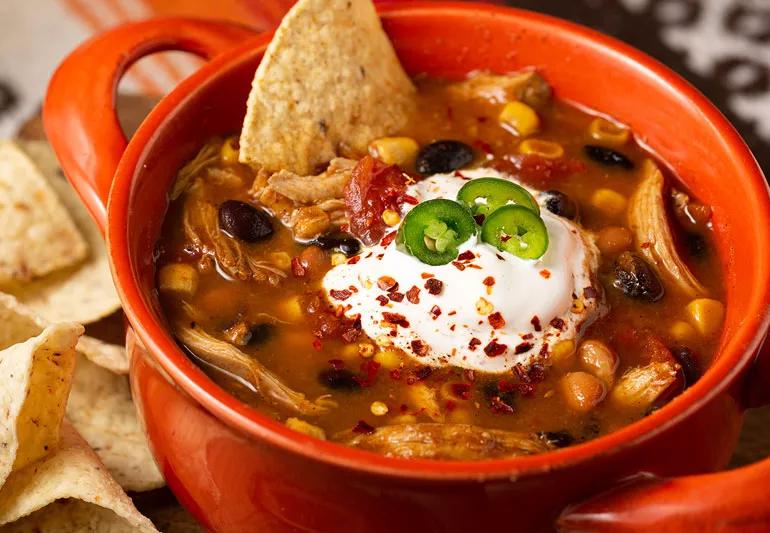
Image content: This image is available to view online.
View image online (https://assets.clevelandclinic.org/transform/0c777879-37c6-4a1c-a547-ddd2acc0ef37/chili-Sour-Cream-1288263412-770x533-1_jpg)
Top view of a bowl of chili topped with sour cream and jalapeños with tortilla chips for dipping.
When it comes to making chili, you’ve got options. Lots and lots of options.
Advertisement
Cleveland Clinic is a non-profit academic medical center. Advertising on our site helps support our mission. We do not endorse non-Cleveland Clinic products or services. Policy
Want beef in your chili to add heartiness and protein? Toss it in the pot. Prefer chicken or turkey? That’ll work, too. Not a meat person? No problem! Tofu can hold a starring role in chili.
Your choices don’t end there, either. A variety of different beans can add flavor and health benefits to chili. Ditto for any number of veggies in your fridge or freezer.
And when it comes to spices … well, how hot do you want your chili to get?
Making a batch of chili is basically a culinary version of a choose-your-own-adventure book. The good news? No matter what decisions you make, odds are you’ll have a tasty meal to serve after a bit of simmering.
But if you’re looking for ideas to add a little extra zing or healthy goodness to your chili, try one (or two or three) of the ingredient ideas on this list from registered dietitian Julia Zumpano, RD, LD.
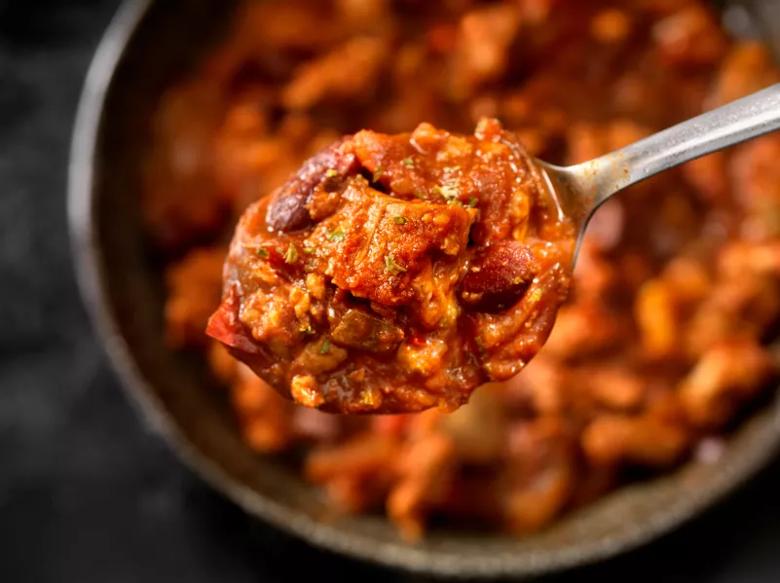
Image content: This image is available to view online.
View image online (https://assets.clevelandclinic.org/transform/0af06795-b1ab-4e72-822f-17686dd4d82d/iStock_000062430224_Small_jpg)
Beef chili is king in many circles — but it’s not exactly the most gentle protein option when it comes to your cardiovascular health. That’s because beef, and red meat in general, is higher in artery-clogging saturated fats.
So, if you’re open to trying something different, Zumpano suggests using one of these proteins in your chili. (Plus, feel good about adding these nutritional benefits.)
Advertisement
Now, if you just can’t imagine making chili without beef, make sure to grab a leaner cut. Zumpano recommends beef between 85% to 90% lean.
Another option? Mix and match proteins in your chili to cut down on the amount of beef in the pot. A chili with half beef and half chicken, for instance, will have less saturated fat and added taste interest.
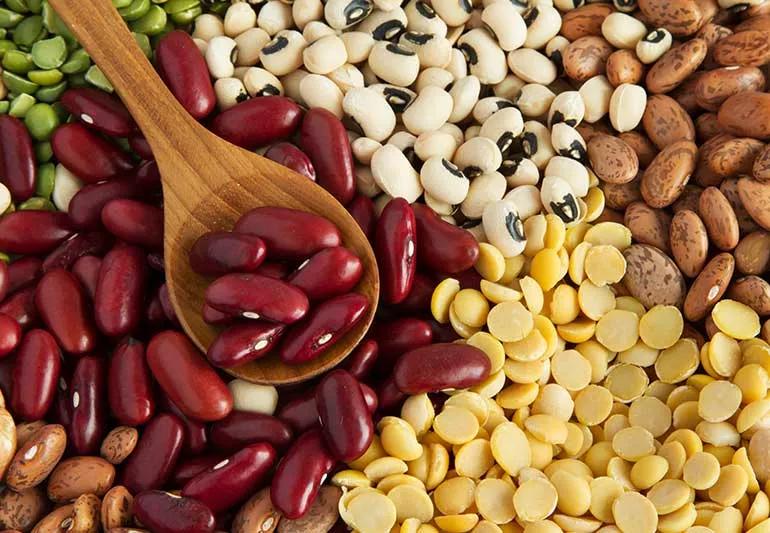
Image content: This image is available to view online.
View image online (https://assets.clevelandclinic.org/transform/c4636082-13e1-4c33-8834-382d4d2e0e52/Beans-Farting-637856596-770x533-1_jpg)
There’s a somewhat heated debate in chili circles about whether beans belong in the recipe. Most of the opposition comes from those who prefer Texas chili, which typically DOES NOT include beans.
Zumpano’s advice? Don’t skip the beans. (Sorry, Texas.)
Beans are chock full of soluble fiber, which offers benefits such as improved heart health, lower cancer risk and better digestion. Fiber also makes you feel fuller, which can keep you from going back for seconds (and help with weight management).
The Mediterranean diet — which many consider the gold standard of eating plans — recommends eating at least three servings of beans or legumes every week.
So, what kind of beans work nicely in chili? Here’s a short (but by no means complete) list:
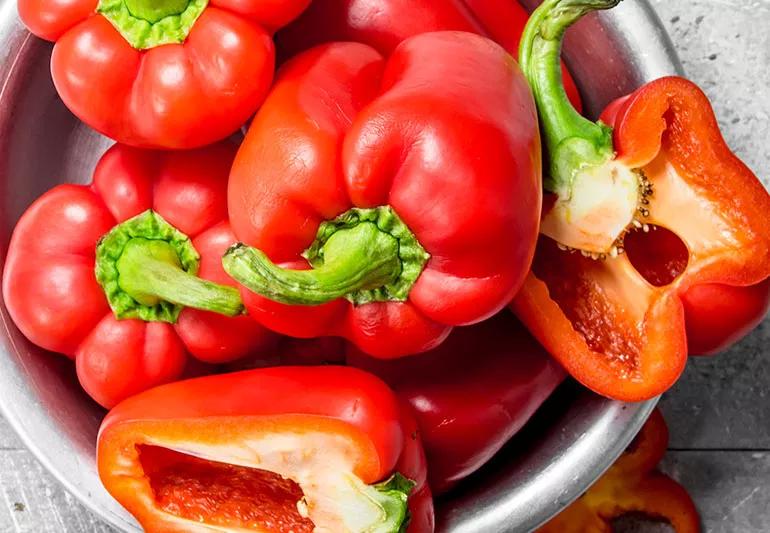
Image content: This image is available to view online.
View image online (https://assets.clevelandclinic.org/transform/fcc891f4-43fe-4695-94b5-392a1fb84da9/red-Peppers-Bowl-1141758180-770x533-1_jpg)
Don’t be shy about adding vegetables to your chili. In fact, Zumpano recommends doubling the veggies in your recipe. (And if your recipe doesn’t include veggies, add them to the ingredient list!)
Veggies add texture and bulk to your dish without bringing extra fat or a ton of calories. Try veggies such as:
Advertisement
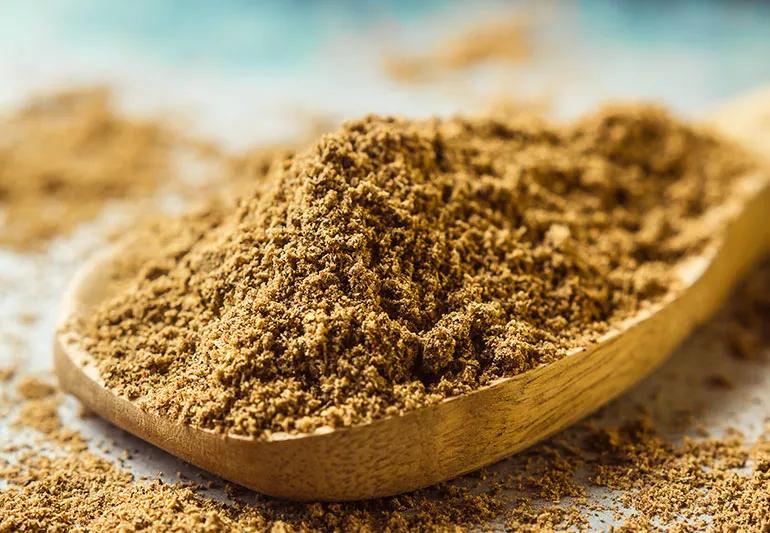
Image content: This image is available to view online.
View image online (https://assets.clevelandclinic.org/transform/7e392e57-b487-45c5-8c72-a6ae770aab52/CC_HE_Cumin_jpg)
A store-bought packet of chili powder is often a go-to for many chili chefs. If you go that route, check labels to avoid added fillers (especially if you’re gluten- or dairy-free) or chemical anti-caking agents.
But don’t be afraid to use dried guajillo, chipotle and ancho chilis to make your own chili powder. Hit your spice rack for some extra zing, too. Options include:
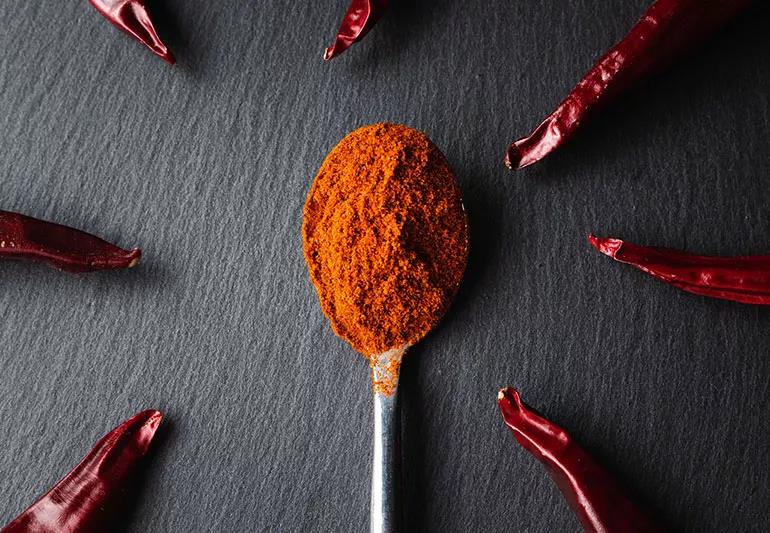
Image content: This image is available to view online.
View image online (https://assets.clevelandclinic.org/transform/d3e1d852-155d-4dde-af74-2c876fc1e242/CayenneBenefits-1205330754-770x533-1_jpg)
Dried, fresh or pickled peppers can differentiate your chili from the pack and bring some serious heat. But while peppers may make your belly feel like it’s on fire, they are actually “firefighters” that can help extinguish inflammation in your body.
Here are a few to try:
Advertisement
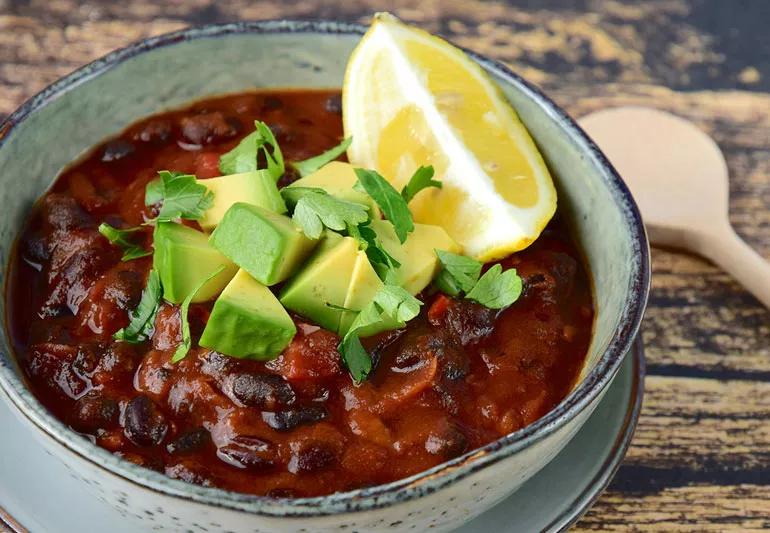
Image content: This image is available to view online.
View image online (https://assets.clevelandclinic.org/transform/c6269a88-ecf5-4a4e-b670-0f146b345de1/black-Bean-Chili-Meatless-1250044750-770x533-1_jpg)
A good bowl of chili speaks for itself. Why destroy it — and your waistline — by drowning it in high-fat, high-calorie toppings? Avoid processed oyster crackers or saltines and use a light hand when selecting fresh, color-adding finishes.
Any (or all) of these toppings are worth your consideration:
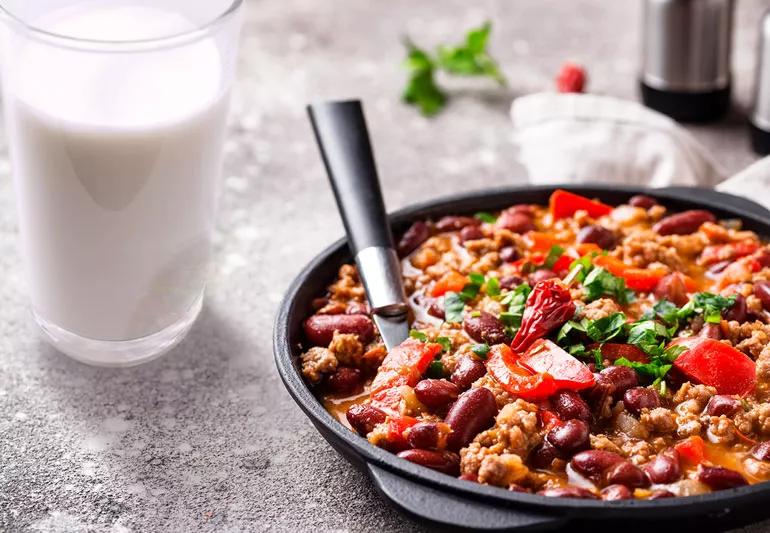
Image content: This image is available to view online.
View image online (https://assets.clevelandclinic.org/transform/77535ffe-75b5-4fdb-afaf-83a77c5a1c4b/spiceyChiliMilk-1181693113-770x533-1_jpg)
Not interested in making so many choices just to get a dinner on the table? Don’t worry! We’ve got you covered. At least one of these six chili recipes should fit your taste.
Advertisement

Sign up for our Health Essentials emails for expert guidance on nutrition, fitness, sleep, skin care and more.
Learn more about our editorial process.
Advertisement
A flavorful and colorful family-pleaser
Creamy and sweetly satisfying
Low in calories, high in flavor
This hearty soup is full of nutrients and ready in 30 minutes
A satisfying, nondairy and low-in-calories soup sure to warm up your day
A delicious soup for any season
Forgo the fat, opt for flavor with this savory soup
Perfect for a rainy spring day
Prioritize your health by managing stress, strengthening your social connections and getting quality sleep
Bolsters, blankets, pillows and blocks can offer extra support, stability and comfort
Allergies, postnasal drip, asthma or reflux could be to blame for a cough that won’t quit